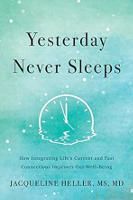
Image by Lukas Bieri
Deeply hidden fears, hurts, and longings may lead to symptoms and eventually maladaptive behaviors that can sabotage us.
I met someone while shopping whose inner saboteur prompted her to behave toward me in a wholly unexpected and egregious way. It demonstrates that when we’re not mindful and self-aware, we can get into a lot of trouble.
I had popped into a boutique and found a few things to try on. Dana, the salesperson, led me to a changing room. When I emerged, Dana wasn’t anywhere to be found. A few shoppers in the front of the store were also unable to find a salesperson to help them, and they left. I waited feeling like I should protect the store. She had left the register and doors unlocked.
Finally, I gave up and left the shop. As I was returning to my car, I saw a commotion at the boutique’s entrance. I turned back, and six police officers were milling about. I told them, “Oh my gosh, I thought something had happened because the salesperson had abandoned the place when I was in there.”
On officer said, “Ma’am, were you in the fitting room about a half-hour ago trying on clothes?” When I told him I was, he asked, “Are you carrying a firearm with you?”
I was bewildered. “What? No, of course not.”
He eyed my jacket pocket with a slight bulge and asked me what was in there. Reflexively, I reached toward the pocket, but suddenly he pulled his gun and pointed it at me, as did the other four male officers. The lone policewoman frisked me for weapons and pulled my car keys from my pocket.
The police officers holstered their guns, obviously relieved, but I was shaken and shocked.
“The saleswoman saw something shiny in your pocket and believed it was a gun. She called 911 and fled the store.”
I asked them how anyone could mistake car keys for a gun — let alone me, a grandmotherly psychiatrist, for a gun-wielding criminal.
Past Trauma Can Disable Good Judgment
After the police apologized, my psychological sleuth kicked in and I realized that Dana must have a psychological disorder. She behaved reflexively because of past trauma. When triggered, it disabled her capacity to exercise sound judgment.
This upsetting incident led me to want to discover what caused Dana to act in such an irrational, impulsive, bizarre manner. I ended up speaking with the manager of the store on the phone and learned that Dana had grown up in a tough neighborhood where gang shootings were common, and as a child, had witnessed a good friend get shot and killed.
The manager said Dana had expressed remorse for calling the police and wanted to meet with me and apologize. To my mind, the more significant issue was that her lack of self-awareness was causing her to act as a self-damaging perpetrator.
There’s no justification to prey upon an innocent and victimize them as a way of coping with grief, rage, or helplessness. No matter how horrible our childhood, no matter how neglected or abused, we must turn it around and not pass it on.
Understanding Our Triggers and Patterns
Fortunately, the manager mandated that Dana start therapy. This was my exact sentiment in response to her actions. Dana needed to understand her trigger and recognize a pattern of emotional overreactions. Her automatic mental construct was, “People are dangerous. Something bad could happen at any point, any time. I have no control. I can’t trust people, even if they seem harmless.”
To become aware of our maladaptive behavior, we must confront our inner saboteur through mindfulness and self-reflection. Mindfulness is an effective way to become aware of buried events from our past. Further, engaging in a practice of self-reflection allows introspectating — or looking into ourselves as though we’re an outside spectator observing our reactions. Breaking down our emotions and triggers in a way that makes logical sense is the first step.
Exercises to Uncover Deeply Hidden Emotions
Use these exercises to uncover deeply hidden hurts, longings, and fears:
1. Practice mindfulness
Try five minutes of mindful meditation and know that each exercise will begin this way. Mindfulness differs from reflective thinking and uses parts of the brain involved closely with relaxation and without premeditated notions, expectations, or judgment.
Find a comfortable place to sit and relax. Now close your eyes and breathe easily. Observe your thoughts and feelings as they come and go. If a thought or feeling distracts or preoccupies you or becomes annoying, acknowledge it, and set it aside for attention later. Return to notice your thoughts without becoming entangled in them.
Move your attention to the center of your chest, where you imagine your heart. Pay attention and see if any feeling of tightness, pain, or grief may be present. See if you can identify any sensations and breathe into them to remain relaxed.
2. Know yourself through letters
Now that you have relaxed your mind, open your eyes and write a letter about yourself. In the letter, answer some or all the following questions — choose the questions that seem most relevant right now. Write what comes to mind first, without censoring or annotating.
- Who and what is important to you in your life?
- Do others appreciate who you are, or does no one understand you?
- What would someone need to know about you to appreciate you?
- What about your behavior and reactions to others do you not understand?
- How do you handle arguments and challenges in your closest intimate relationships?
- Do you feel sorry for yourself? If so, why?
- What would you like people to know about you?
- What can someone say to you that will push your buttons and make you feel livid? (There must be an answer to this question.)
- What would you not like anyone to know about you?
Make a copy of the letter and put it away for now or create a file on your computer. You will decide when to reread your letter; anytime is the right time.
Implementing a practice of mindfulness and self-reflection into our daily lives will boost our capacity for self-awareness over time. With a goal of confronting our inner saboteur, we can make the unconscious conscious.
Copyright 2023. All Rights Reserved.
Printed with permission of the publisher,
Greenleaf Book Group Press.
Book by this Author:
BOOK: Yesterday Never Sleeps
Yesterday Never Sleeps: How Integrating Life's Current and Past Connections Improves Our Well-Being
by Jacqueline Heller MS, MD
 In Yesterday Never Sleeps, Jacqueline Heller draws upon decades of clinical experience to weave together a powerful narrative that contains neuroscience, memoir of her life as a child of Holocaust survivors, and patient histories involving a range of psychological ills and trauma.
In Yesterday Never Sleeps, Jacqueline Heller draws upon decades of clinical experience to weave together a powerful narrative that contains neuroscience, memoir of her life as a child of Holocaust survivors, and patient histories involving a range of psychological ills and trauma.
Dr. Heller offers a uniquely holistic approach, demonstrating how the therapeutic process and self-analysis help us make sense of our history and forge a better future.
For more info and/or to order this hardcover book, click here. Also available as a Kindle edition.
About the Author
 Jackie Heller, MD, a psychoanalyst, is board certified in psychiatry and neurology. Her professional experience as a practicing clinician has allowed her extensive insight into the vast range of human experiences.
Jackie Heller, MD, a psychoanalyst, is board certified in psychiatry and neurology. Her professional experience as a practicing clinician has allowed her extensive insight into the vast range of human experiences.
Her new book, Yesterday Never Sleeps (Greenleaf Book Group Press, August 1, 2023), delves into her personal experience with family trauma and helping others work through their own.
Learn more at JackieHeller.com.





























